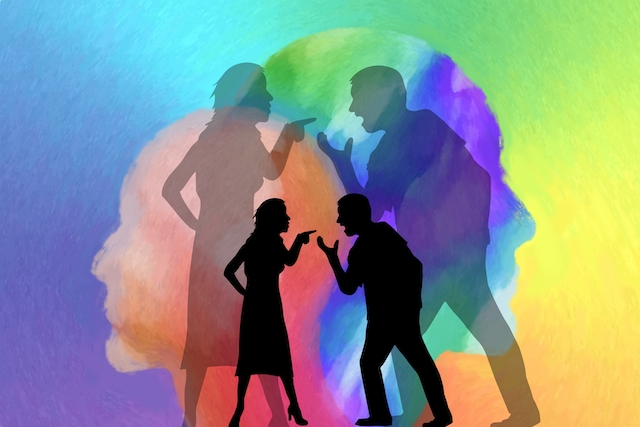
“When we get too caught up in the busyness of the world, we lose connection with one another—and ourselves.” ~Jack Kornfield
The quality of our relationships has a massive impact on our levels of happiness and well-being.
Nurturing our relationships requires time, attention, and effort. But it’s all too easy to become sidetracked and complacent, and to stop appreciating and truly connecting with those closest to us. Often, we feel we are simply too busy to focus on how we can improve the situation. Life seems to get in the way.
Like everyone else I’ve experienced plenty of ups and downs in my relationships, and I know all too well how draining and frustrating those “down” times can be. I used to hyper-focus on what was “wrong” in my relationships, which resulted in more dissatisfaction until all I could see were the problems, not the people.
In the past I used to brood over the “wrong” things my loved ones said or did.
As a result, small matters, such as forgetting to call me to say they’d be late or not doing the dishes when I had cooked dinner, could easily become bigger issues. I found myself forgetting the loving and caring things they did and instead focusing on my disappointment and irritation.
It’s hard to feel like that when you love someone because it chips away at the intimacy and joy in the relationship. And if it continues for long enough, it can break the relationship altogether.
Relationships do of course change over time, and problems occur, but that doesn’t mean they have to change for the worse. Regardless of what we feel is “wrong” or missing in our relationships, we can still improve our connections relatively quickly and easily.
I discovered that all it takes is a change in mindset.
What We Focus on Expands
When we complain and find fault with our loved ones, all we can see are their flaws. Niggling little things, which maybe never bothered us before, can become increasingly annoying. This can snowball so that you start to notice more and more annoying habits.
The truth is, our increased dissatisfaction with our loved ones has a lot to do with what we give our attention to and how we experience what we see and perceive.
Anyone can become really irritating if all we focus on and give our energy to on a regular basis are their perceived flaws and annoying habits. What we focus on grows. What we think about expands—the good and the bad. And that focus can stop us from being aware of other things going on around us.
When our brain is occupied with one thing, its ability to pay attention to something else can become blocked. In the early days of a romantic relationship we are often focused on the wonderfulness of our new partner. We don’t see the less wonderful qualities that might start to annoy us months later. This bias of course works the other way around too.
Improving our relationships comes down to shifting our focus and embracing mindfulness.
Now, before I go on to describe the mindfulness activity I need to make it clear that the activity relates to changing your perspective about the niggling little habits or behaviors your loved one might have that drive you crazy, or the feeling your relationship is stuck in a rut.
If, however, your partner or loved one makes you feel threatened or unsafe, if they are abusing or bullying you in any way, you should leave.
It is also important to note that if your loved one’s behavior has altered drastically over the course of your relationship, changing from charming to controlling, for example, you should move on too.
You were led to believe they were someone very different to what they actually are—no amount of focus shifting can change that.
The Simple Mindfulness Activity
First, take a pen and notebook and find somewhere quiet to sit.
Begin by writing down at least ten things you feel grateful for in your life.
Gratitude is a great way to focus on the positives and lift your mood and feel more loving in general. Rather than focusing on problems, count your blessings.
Now think back to the time when you felt the closest to your loved one. Really focus on those feelings of love and write down what it felt like to be in that moment.
Next, write down all the things you liked and appreciated about your loved at that time—include all their good qualities.
Before you go to bed at night, add at least three more items to the list about what you liked about your loved one today.
These can be simple things, such as: He made me a cup of coffee after dinner; she told me a funny joke that made me laugh; he helped me dry the dishes; she complimented me on my new shirt.
Read the list when you wake up in the morning.
Every day for the next thirty days, add at least three new positive items to the list and read them first thing in the morning. You can also add more items to your general gratitude list if you wish.
When I first tried this activity, I was surprised to find how many blessings I had and how much I was thankful for, including my connections with my loved ones. My feelings of love and appreciation for them greatly increased, and I also felt better about myself. Writing everything down helped me to clear away a lot of mental junk and see the richness of my life and relationships more clearly.
Why the Activity Works
To recap, what you focus on expands and becomes more active in your mind.
From day one, you’ll find your attention shifting and, as a result, it will become easier for you to access those positive thoughts. It will help you see your loved one in a new light, and instead of fixating on their irritating habits, you’ll instead choose to place your attention on their good qualities.
Those thoughts will become more active in your mind and, since our thoughts influence our feelings, you’ll feel more loving as a result. And the more you show your appreciation for your loved one, the more you’ll get back in return.
They’ll be more appreciative and loving toward you. You’ll get more back of what you appreciate about them, whether that’s their thoughtfulness, humor, or hugs. With this mindset, problems tend to fade away or solve themselves far more easily. I discovered that many of the “problems” in my relationship were a result of my brooding and negativity.
It’s important to be aware of what you’re thinking about and where you place your energy on a day-to-day basis. Carrying around a mind full of complaints, stress, and resentment is draining, whereas positive loving thoughts make you feel lighter and more connected.
And that positive mental attitude will give you more energy and clarity to handle any problems that come along in your relationships and your life in general. You’ll see options and solutions that your negativity stopped you seeing before.
There are several other things to consider if you feel dissatisfied with your relationship:
Unrealistic Expectations About Others
Do you expect too much from certain people in your life, who are, after all, fallible human beings like everyone else?
I’m not referring here to “settling” for less or accepting bad behavior or disrespect, but the kind of expectations that are difficult for pretty much anyone to meet. (I’ve certainly been guilty of this in the past due to unhealed emotional wounds; rather than working on healing myself I expected my loved ones to take on the task.)
We all have annoying habits—are theirs really so bad? Are your standards unrealistically high and, if so, what does that say about your beliefs about relationships? Is perfectionism something you strive for in yourself and also expect in others? Do you find it hard to accept others’ flaws as well as your own?
Fairy tales, Hollywood films, social media, and certain magazines all have a lot to answer for when it comes to forming unrealistic expectations of a “perfect” life and relationship. These unrealistic expectations lead to a lot of disappointment and upset, and can be one of the greatest threats to relationships.
No person or relationship is perfect. We do our partner and ourselves a disservice when we expect them to be mind readers, understand all our emotions, always be passionate and romantic, and make us happy at all times. Such pressures can be unbearable.
In the past I expected my loved ones to be able to soothe my hurt feelings or dissatisfaction without being told why I felt upset. It was as if I expected them to have a superpower I myself did not possess!
Good relationships require communication, patience, and compromise. And there will always be ups and downs, good times and bad times, conflicts and problems—that’s just how life is.
The first sign of a problem does not mean the relationship is not “good” anymore, only that it’s in need of some attention and help.
We need to remember that we are all imperfect human beings trying to do our best.
Feeling Incomplete
Do you expect your partner—and their love—to complete you? Do you feel incomplete, especially when you’re not in a relationship?
In the early stages of a romantic relationship, partners tend to put each other on a pedestal and see only the best in each other. It can make us feel whole and complete, and like we’ve become the best version of ourselves. It can be an intoxicating time.
But once the relationship has evolved into something steadier, those feelings of completeness can fade, leaving us dissatisfied with life and our partner.
The thing is, the most important relationship in your life is the relationship you have with yourself. And if you don’t love yourself, your ability to truly love others is compromised.
Self-love has nothing to do with arrogance or conceit, but is instead about healthy self-respect, self-acceptance, and self-care. You feel complete as you are; you don’t need a relationship or anything else to make you feel whole.
When we enter into a relationship feeling whole and secure in ourselves, we aren’t looking for a partner to complete us. Instead, we bond with our partner in a more fulfilling, authentic, mature and emotionally connected way.
Self-love is never selfish; it is essential for successful relationships.
Optimist or Pessimist?
Are you a glass-half-full or a glass-half-empty type of person?
If you’re on the pessimistic side, you might be more inclined to focus on what is “wrong” or missing in your relationship than the good things.
Negativity and positivity are habits that we often acquire in childhood due to our family’s mindset and attitudes.
I grew up in a household with glass-half-empty people, so it seemed inevitable I would take on this mindset too. As I got older, I realized I didn’t want to live a life where negativity was my usual way of relating to the world. I saw I had a choice: I could choose to take up the good habit of positivity instead.
We all choose what we focus on—you have a choice where you place your focus. Life is usually far more enjoyable when we focus on the positive rather than the negative.
No One but You Can Make You Happy
We often look for happiness outside of ourselves and expect other people to make us happy.
As mentioned before, the quality of our relationships and our role in them has a big impact on our well-being, but the truth is the only person who can make you happy is you. Happiness lies within you, nowhere else. It is not “out there.”
This can be a wonderful and empowering revelation. No one and no one thing have power or control over your happiness. It’s all within you. You are not responsible for others’ happiness and they are not responsible for your happiness.
What you are responsible for is your half of the relationship, and you should treat your partner in a loving and respectful manner, but ultimately you cannot make your partner happy. That’s their job.
I hope you’ll follow the simple mindfulness activity for thirty days—if you do you will soon feel the benefits.
When we give our relationships our time and attention, we show our loved ones how important they are to us, and we create deeper and more loving bonds with them.
About KJ Hutchings
KJ Hutchings is a fiction and self-help writer and artist. Visit her site kjhutchings.com to get 25% off any artwork in her online shop, free fiction and regular updates. You can also find her on Facebook and Instagram.
- Web |
- More Posts













 Though I run this site, it is not mine. It's ours. It's not about me. It's about us. Your stories and your wisdom are just as meaningful as mine.
Though I run this site, it is not mine. It's ours. It's not about me. It's about us. Your stories and your wisdom are just as meaningful as mine.
Relationships are giving and taking and both need to work on the balance. It´s somehow funny how human psyche works though. In the first few weeks of falling in love, we tend to out them on pedestal, let all the bright light of perfection shine on them. After that glow disappears we see the real human underneath it, the one with skin irritations, the scars on mind and soul and consequently the issues from past experiences.
You really nailed it with the “think back to the time when you felt the closest to your loved one” because doing this, that old glow comes back and shines again, this time not on the perfection of the other, but on the imperfection you learned to love.
Thanks so much for your comment, I’m glad you found the article useful! Relationships certainly do need give and take in order to mature and thrive.
What do we do when we no longer like certain materialistic possessions .We discard them. Do exactly the same with family and friends. One short life even if we lived to 100 years old, so why waste precious time on people who are no good for us? Cut contact, move on and find people who you like and they like you. Underneath this skin is skeleton & skin decomposes quickly. Bones or ash is all that is left. Act quickly whilst we are alive. Don’t spend time wasting it on stupid petty arguments with family or friends. Live whilst you can, and enjoy. People are not everything!
Thank you for your comment Miranda!
Thank you for sharing. I definitely see what you are pointing to. I would add another point to the article, about the projections we have on the people around us. If we take a closer look, we will see that we are actually judging ourselves, not the other. We are annoyed with ourselves. It just takes practice and stillness to recognize that we have a problem with our thinking, we suffer and feel agitated due to our thoughts, and not because of the other person.
Thank you so much for your comment and insights. You are very right that projection can play an important part in relationships and mindfulness is a great way to handle negative thoughts and feelings.